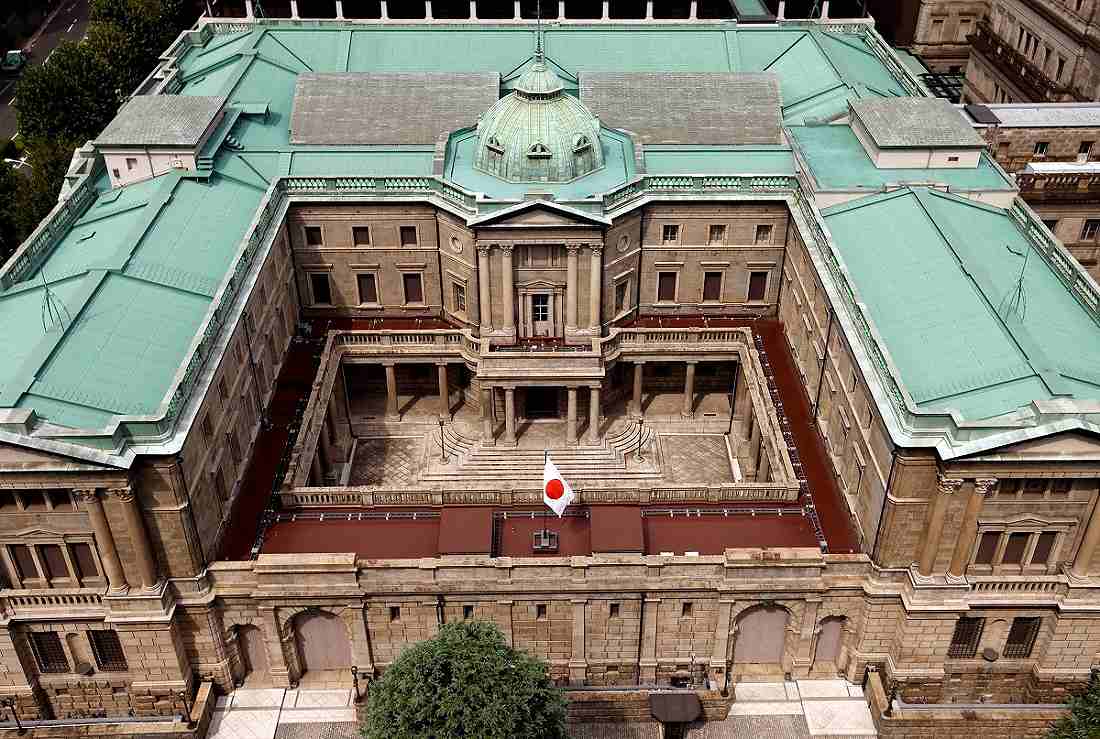BOJ To Allow Long-Term Interest Rates to Rise Above 1% with Revision to JGB Yield Curve Control (UPDATE 1)

Bank of Japan in Tokyo, Japan September 20, 2023
12:34 JST, October 31, 2023 (updated at 18:00 JST)
The Bank of Japan decided during its monetary policy meeting Tuesday to effectively let long-term interest rates rise above 1%.
The central bank will maintain the yield on benchmark 10-year Japanese government bonds (JGBs) at around zero percent and will conduct yield curve control (YCC) with the ceiling of “1% for these yields as a reference in its market operations,” eliminating the previous fluctuation range set at “plus or minus 0.5%.”
With market interest rates rising to above 0.95%, the bank deemed that excessive YCC further weakens the yen against the dollar, resulting in a negative impact on the economy.
The BOJ will continue YCC of keeping long-term interest rates at around zero percent. At its July meeting, the bank raised an offer rate to purchase JGBs at 1% from the previous 0.5% through fixed-rate purchase operations. However, domestic long-term interest rates, which are rising in tandem with the high level of U.S. long-term interest rates, spurred the bank to shift to nimble policy operations.
Specifically, the BOJ will review fixed-rate purchase operations — its most powerful means of curving interest rates — in which the BOJ buys an unlimited number of government bonds at its offered yield in order to effectively create a ceiling on market interest rates. It will not set a specific offer rate for fixed-rate purchase operations but make a decision “each time, taking account of market rates and other factors.”
The domestic long-term interest rate before Tuesday’s BOJ decision rose to 0.955%, close to the level of conducting fixed-rate purchase operations.
At the time of its July meeting, BOJ Gov. Kazuo Ueda said the bank “does not expect the rate to rise to 1%.” However, the rise occurred in contrast to his speculation.
If it tries to control the rise in long-term interest rates too much, the BOJ will end up buying a large amount of JGBs, widening the gap between Japanese and U.S. interest rates. This could further weaken the yen against the dollar, pushing up import prices and adversely affecting the domestic economy.
The BOJ will continue to maintain the short-term policy interest rate of minus 0.1%, and many believe that overall market interest rates, including long-term rates, are still at low levels.
The central bank is believed to have decided that allowing interest rates to rise to a certain extent would be less of a burden on economic activity than continuing large-scale JGB purchases and having a negative impact on the market.
After Tuesday’s meeting, the BOJ released its trimonthly Outlook for Economic Activity and Prices (Outlook Report), in which it forecast inflation rates for the consumer price index will rise to 2.8% in fiscal 2023 from July forecasts of 2.5%, and to 2.8% in fiscal 2024 from July forecasts of 1.9%, taking into account the prolonged price pass-through due to high raw material prices.
Top Articles in Business
-

Prudential Life Insurance Plans to Fully Compensate for Damages Caused by Fraudulent Actions Without Waiting for Third-Party Committee Review
-

Narita Airport, Startup in Japan Demonstrate Machine to Compress Clothes for Tourists to Prevent People from Abandoning Suitcases
-

Japan, U.S. Name 3 Inaugural Investment Projects; Reached Agreement After Considerable Difficulty
-

Toyota Motor Group Firm to Sell Clean Energy Greenhouses for Strawberries
-

SoftBank Launches AI Service for Call Centers That Converts Harsh Customer Voices into Softer Voices
JN ACCESS RANKING
-

Japan PM Takaichi’s Cabinet Resigns en Masse
-

Japan Institute to Use Domestic Commercial Optical Lattice Clock to Set Japan Standard Time
-

Israeli Ambassador to Japan Speaks about Japan’s Role in the Reconstruction of Gaza
-

Man Infected with Measles Reportedly Dined at Restaurant in Tokyo Station
-

Videos Plagiarized, Reposted with False Subtitles Claiming ‘Ryukyu Belongs to China’; Anti-China False Information Also Posted in Japan




















